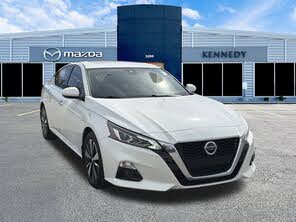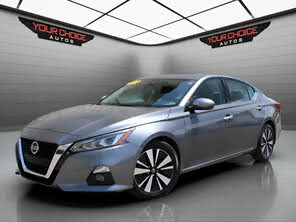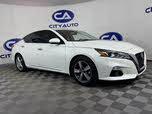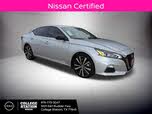2021 Nissan Altima vs 2020 Hyundai Elantra
Overview | |
MSRP$19,300 | MSRP$24,550 |
Listings1020 | Listings1436 |
Ratings & Reviews | |
User Reviews | User Reviews |
Expert reviews8.3 out of 10 | Expert reviews7.2 out of 10 |
Pros
Cons
| Pros
Cons
|
2020 Hyundai Elantra Reviews SummaryHyundai isn’t pulling any punches when it comes to the compact car segment, where value is of utmost importance. And though a completely redesigned 2021 Elantra is coming soon, the automaker bestows several value-enhancing improvements upon the outgoing 2020 Hyundai Elantra compact sedan. They include free scheduled maintenance, improved fuel economy ratings, and new standard safety features. | |
2021 Nissan Altima Reviews SummaryThe 2021 Nissan Altima is a popular midsize sedan now in the third year of its sixth generation of production. The Altima debuted as a 1993 model and has spent the decades nudged from the spotlight by the Toyota Camry and Honda Accord, despite continuous evolution and improvement over the years. Don’t feel bad for the Altima—it has a lot of fans, and some innovative features it hopes will allow it to take center stage someday. | |
No video found | No video found |
Popular Features & Specs | |
Engine2.0L 147 hp I4 | Engine2.5L 182 hp I4 |
Drive TrainFWD | Drive TrainFWD |
Seating Capacity5 | Seating Capacity5 |
Horsepower147 hp @ 6200 rpm | Horsepower182 hp @ 6000 rpm |
MPG City31 | MPG City28 |
MPG Highway41 | MPG Highway39 |
Engine | |
Engine Name2.0L 147 hp I4 | Engine Name2.5L 182 hp I4 |
Torque132 lb-ft @ 4500 rpm | Torque178 lb-ft @ 3600 rpm |
Horsepower147 hp @ 6200 rpm | Horsepower182 hp @ 6000 rpm |
DrivetrainFWD | DrivetrainFWD |
Fuel Economy | |
MPG City31 | MPG City28 |
MPG Highway41 | MPG Highway39 |
Interior | |
Seating Capacity5 | Seating Capacity5 |
Safety | |
Front Crash Overall4 | Front Crash Overall4 |
Side Crash Overall4 | Side Crash Overall5 |
Dimensions & Capacity | |
Cargo Space14.4 cu ft | Cargo Space15.4 cu ft |
Curb Weight2844 lbs | Curb Weight3207 lbs |
Height56.5 in | Height56.7 in |
Length181.9 in | Length192.9 in |
Width70.9 in | Width72.9 in |
Wheelbase106.3 in | Wheelbase111.2 in |
Maximum Payload1080 lbs | Maximum Payload1121 lbs |
Number of doors4 | Number of doors4 |
Overview | ||
MSRP | $19,300 | $24,550 |
Listings | ||
Ratings & Reviews | ||
User reviews | ||
Expert reviews | 8.3 out of 10Read full review | 7.2 out of 10Read full review |
Pros & cons | Pros
Cons
| Pros
Cons
|
Summary | Hyundai isn’t pulling any punches when it comes to the compact car segment, where value is of utmost importance. And though a completely redesigned 2021 Elantra is coming soon, the automaker bestows several value-enhancing improvements upon the outgoing 2020 Hyundai Elantra compact sedan. They include free scheduled maintenance, improved fuel economy ratings, and new standard safety features. | The 2021 Nissan Altima is a popular midsize sedan now in the third year of its sixth generation of production. The Altima debuted as a 1993 model and has spent the decades nudged from the spotlight by the Toyota Camry and Honda Accord, despite continuous evolution and improvement over the years. Don’t feel bad for the Altima—it has a lot of fans, and some innovative features it hopes will allow it to take center stage someday. |
Video | No video found | No video found |
Popular Features & Specs | ||
Engine | 2.0L 147 hp I4 | 2.5L 182 hp I4 |
Drive Train | FWD | FWD |
Seating Capacity | 5 | 5 |
Horsepower | 147 hp @ 6200 rpm | 182 hp @ 6000 rpm |
MPG City | 31 | 28 |
MPG Highway | 41 | 39 |
Engine | ||
Engine Name | 2.0L 147 hp I4 | 2.5L 182 hp I4 |
Torque | 132 lb-ft @ 4500 rpm | 178 lb-ft @ 3600 rpm |
Horsepower | 147 hp @ 6200 rpm | 182 hp @ 6000 rpm |
Drivetrain | FWD | FWD |
Fuel Economy | ||
MPG City | 31 | 28 |
MPG Highway | 41 | 39 |
Interior | ||
Seating Capacity | 5 | 5 |
Safety | ||
Front Crash Overall | 4 | 4 |
Side Crash Overall | 4 | 5 |
Dimensions & Capacity | ||
Cargo Space | 14.4 cu ft | 15.4 cu ft |
Curb Weight | 2844 lbs | 3207 lbs |
Height | 56.5 in | 56.7 in |
Length | 181.9 in | 192.9 in |
Width | 70.9 in | 72.9 in |
Wheelbase | 106.3 in | 111.2 in |
Maximum Payload | 1080 lbs | 1121 lbs |
Number of doors | 4 | 4 |
The 2020 Hyundai Elantra retained its bold geometric styling from the previous year, which was a departure from its earlier Genesis Jr. design cues. This model year did not introduce any significant visual changes, maintaining the angular aesthetic that was intended to pave the way for the 2021 model's dramatic styling. The Elantra was available in six versions, ranging from the base SE to the sporty Sport trim, with prices starting at $19,300 and reaching up to $24,150. The Limited trim, which was tested, included the Ultimate Package, bringing the total cost to $27,630. The Elantra's black paint job highlighted its angular design elements, creating a striking contrast with the chrome detailing, resulting in a stylish appearance that might not appeal to everyone. Inside, the Elantra's interior was updated to offer a more upscale look, with silver trim accents enhancing the overall aesthetic, though some hard plastics remained, reminding occupants of its mainstream compact car status.
The 2021 Nissan Altima showcased a strong family identity with its bold V-Motion grille, available in chrome or dark chrome, depending on the trim level. The Altima's design featured a sleek, aerodynamic profile with a sloping roofline, giving it a modern, coupe-like appearance. However, its proportions, with significant overhangs and a short dash-to-axle distance, lent it a slightly old-fashioned look. Despite this, modern features like LED lighting and a range of wheel options kept the Altima's appearance contemporary. The fit and finish were exceptional, with deep, lustrous paint and rich chrome details. The Altima offered nine exterior colors, some with premium pricing. Inside, the dashboard was uncluttered and intelligently laid out, with a standard 8-inch touchscreen display positioned for optimal safety and convenience. The interior materials improved with higher trim levels, offering a more refined experience.










The 2020 Hyundai Elantra featured a base 147-horsepower, 2.0-liter four-cylinder engine paired with a new continuously variable transmission (CVT), replacing the previous six-speed automatic. This change contributed to a $1,100 price increase over the previous year. The Elantra was front-wheel drive across all models. Specialty models included the Elantra Eco, with a turbocharged 1.4-liter engine producing 128 horsepower and 156 lb-ft of torque, paired with a seven-speed dual-clutch automatic transmission (DCT). The Eco model boasted a combined fuel economy of 36 mpg. The Elantra Sport trim offered a 1.6-liter turbo engine with 201 horsepower and 195 lb-ft of torque, featuring an independent rear suspension for improved handling. The Elantra Limited test car, with its 2.0-liter engine and CVT, provided a satisfactory driving experience, though real-world fuel economy fell short of expectations, averaging 29.3 mpg. The torsion beam axle rear suspension detracted from ride quality, making the Elantra feel unsettled on uneven surfaces.
The 2021 Nissan Altima offered a choice between two powertrains. Most configurations featured a naturally aspirated 2.5-liter four-cylinder engine with 182 horsepower and 178 lb-ft of torque, paired with Nissan's Xtronic CVT. Front-wheel drive was standard, with all-wheel drive available on most trims. The 2.5-liter engine delivered fuel economy ratings of 28 mpg city/39 mpg highway/32 mpg combined with FWD, and 25 mpg city/35 mpg highway/29 mpg combined with AWD. The Altima SR VC-Turbo trim featured a unique variable compression turbocharged 2.0-liter engine, producing 248 horsepower and 273 lb-ft of torque. This engine offered a lively performance, with fuel economy ratings of 25 mpg city/34 mpg highway/29 mpg combined. The Altima's four-wheel independent suspension provided a comfortable ride, though the sport-tuned suspension on the VC-Turbo model did not offer a noticeable difference. The electric-powered steering provided decent feedback and feel.
The 2020 Hyundai Elantra was among the roomier compact cars, comfortably accommodating four adults, with a fifth person fitting for short trips. The Limited test car featured power driver's seat adjustment, leather upholstery, and a sliding center console armrest for added comfort. All Elantras included a front passenger seat-height adjuster and a dual-zone automatic climate control system with a Clean Air ionizer and automatic defogging. Heated front seats were available on all but the SE and SEL trims. Interior storage was well-proportioned, and the trunk offered 14.4 cubic feet of space, comparable to some midsize sedans. A thoughtful touch was the interior grab handle inside the trunk lid for easy closure.
The 2021 Nissan Altima featured Nissan's acclaimed Zero Gravity front seats, providing exceptional comfort for long drives. Upper trim levels offered power adjustment, position memory, leather appointments, and heated seats. The front cabin included ample storage, with a large glovebox, center console storage bin, cupholders, and door pockets. The second row was spacious for two adults, with a 60/40 split-folding design for trunk access. The trunk itself offered 15.4 cubic feet of space, accommodating a significant amount of cargo.
The 2020 Hyundai Elantra came standard with a touchscreen infotainment system, Bluetooth, and a USB port. The base SE trim featured a 5-inch screen, while the SEL trim upgraded to a 7-inch display with Apple CarPlay, Android Auto, and SiriusXM satellite radio. The Value Edition included a complimentary subscription to Blue Link Connected Car and Remote plans for three years. The Limited trim added wireless smartphone charging and a premium Infinity sound system. The Ultimate Package increased the touchscreen size to 8 inches and added navigation and SiriusXM data services. The infotainment system was user-friendly, with shortcut buttons and volume/tuning knobs for easy operation.
The 2021 Nissan Altima included standard tech features such as Nissan Intelligent Key with pushbutton start, remote engine start, Bluetooth, and more. Apple CarPlay and Android Auto were standard on all but the S model. The base touchscreen was 7 inches on the S trim, with an 8-inch NissanConnect touchscreen on other trims. Higher trims featured a Bose audio system and Active Noise Cancellation. Nissan Door to Door Navigation was standard on the Platinum trim and optional on others. NissanConnect Services offered a range of features, including a WiFi hotspot and emergency crash notification.
The 2020 Hyundai Elantra featured Hyundai Smart Sense, a suite of advanced driving assistance systems (ADAS) standard on all trims. This included forward-collision warning, automatic emergency braking, lane departure warning, lane-keeping assist, and a driver attention monitor. Higher trims added blind-spot warning, rear cross-traffic alert, and full LED headlights with automatic high-beam operation. The Ultimate Package included adaptive cruise control and pedestrian detection. The Elantra earned a Top Safety Pick from the IIHS and a four-star overall rating from the NHTSA, with a noted concern about rear-door intrusion during side-impact tests.
The 2021 Nissan Altima featured Nissan Safety Shield 360, a comprehensive suite of safety features standard on SV trims and above. This included automatic emergency braking with pedestrian detection, rear automatic braking, rear cross-traffic alert, blind-spot warning, lane-departure warning, and high-beam assist. ProPilot Assist was available for highway driving assistance, and an Intelligent Around View Monitor was offered on upper trims. The Altima received a five-star overall safety rating from the NHTSA and a Top Safety Pick + rating from the IIHS.
CarGurus highlights

According to CarGurus experts, the overall rating for the 2020 Hyundai Elantra is 8.3 out of 10, while the 2021 Nissan Altima scores 7.2 out of 10. Based on these ratings, the 2020 Hyundai Elantra is the recommended choice, offering a better balance of features, performance, and value.
Choose the 2021 Nissan Altima if:
- You desire a midsize sedan with advanced safety features and high safety ratings.
- You appreciate a comfortable ride with Nissan's Zero Gravity seats.
- You want a choice between a fuel-efficient engine and a more powerful turbo option.
Choose the 2020 Hyundai Elantra if:
- You prioritize a lower starting price and a range of trim options.
- You value a user-friendly infotainment system with available premium sound.
- You seek a compact car with a spacious interior and trunk.
CarGurus highlights

According to CarGurus experts, the overall rating for the 2020 Hyundai Elantra is 8.3 out of 10, while the 2021 Nissan Altima scores 7.2 out of 10. Based on these ratings, the 2020 Hyundai Elantra is the recommended choice, offering a better balance of features, performance, and value.
Choose the 2021 Nissan Altima if:
Shop Now- You desire a midsize sedan with advanced safety features and high safety ratings.
- You appreciate a comfortable ride with Nissan's Zero Gravity seats.
- You want a choice between a fuel-efficient engine and a more powerful turbo option.
Choose the 2020 Hyundai Elantra if:
Shop Now- You prioritize a lower starting price and a range of trim options.
- You value a user-friendly infotainment system with available premium sound.
- You seek a compact car with a spacious interior and trunk.

By: CarGurus + AI
At CarGurus, our team of experienced automotive writers remain at the heart of our content operation, conducting hands-on car tests and writing insightful guides that are backed by years of industry experience. To complement this, we are harnessing AI to make our content offering more diverse and more helpful to shoppers than ever. To achieve this, our AI systems are based exclusively on CarGurus content, ratings and data, so that what we produce is both unique to CarGurus, and uniquely helpful to car shoppers.








































